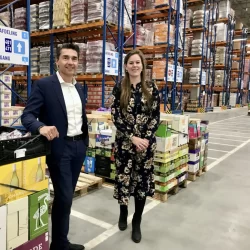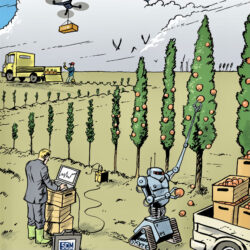New DC takes Aldi into final phase of supply chain redesign

By opening its brand-new mega distribution centre (48,000m2) in the Dutch city of Deventer, grocery chain Aldi has taken another important step in the strategic redesign of its supply chain in the Netherlands, which started in 2019. “We’re now supplying all 500 of our stores from six distribution centres (DCs) instead of nine,” says Antoine Doppenberg, Managing Director Supply Chain Management at Aldi. “The final step is to relocate our DC in Drachten to Groningen, and then we will have the ideal distribution network to achieve our growth ambitions.” During the official opening of the DC, he and Leonie van Heijningen, Director Logistics, explained the choices made and how the DC fits in with the new supply chain strategy.
By Harm Beerens
In the Dutch supermarket landscape, Aldi positions itself as a real discount retailer: efficiency-oriented stores with a compact range and no home delivery service, but high quality, lots of special offers and the lowest possible prices. This has an impact on the warehouse design too, according to Van Heijningen (pictured): “Here in Deventer, we hold about 1,700 articles in stock, mainly fast-movers. The large majority of the products that come in from our supplier are sent to the stores on the same day or the day after. We have analysed the calculations carefully, of course, but based on this assortment and our high turnover rate, it wouldn’t pay off to set up a mechanized high-bay warehouse for this. So instead, we’ve opted for a largely manual pick-by-voice operation supported by semi-automatic order picking trucks, or in other words AGVs.”
Supply chain focus
The new DC in Deventer is an important step in Aldi’s transition to a supply chain focus, which was initiated a few years ago. “When I joined Aldi at the end of 2018, there was no overarching supply chain department and the planning was still decentralized,” said Doppenberg (pictured). “Stores did their own ordering and each region managed its own DC and store replenishment process. Significant improvements have been made since then. Our head office in Culemborg now influences the ordering recommendations at store level, and within the next six months we’re also implementing centralized ordering at DC level. This eases the workload for store managers, plus it enables us to better anticipate changes in demand caused by the weather, bank holidays and promotional campaigns. Moreover, centralized planning allows us to share forecasts with suppliers and thus prevent bullwhips, resulting in lower costs and better on-shelf availability in our stores.”
Optimal efficiency with six DCs
The new DC in Deventer replaces two existing Aldi DCs (in Groenlo and Ommen), bringing the total number to six. “We used to have nine DCs, but the network studies we carried out showed that we could supply our shops most efficiently from six DCs. Larger DCs like the one in Deventer allow us to replenish more stores. This creates a higher turnover rate and you can get by with less safety stock overall. Products then spend a shorter amount of time in the DC, so on average they are fresher when they arrive in stores. We will soon be opening another new DC, in Groningen, to replace the one in Drachten. And then we will be fully ready to realize our growth ambitions for the coming years.”
Insourcing frozen food products
Aldi’s nationwide supply chain mindset for store replenishment is also underlined by the fact that all its shops will soon receive their frozen food products from the Deventer DC. “Frozen food products place such specific demands on your DC that it doesn’t make sense to set up frozen facilities in each one. For now, we are still outsourcing this to a number of logistics service providers, but thanks to the advanced frozen food facilities here in Deventer, we will be able to bring it back in-house. This will put us back in control of the replenishment and warehouse operation rather than being dependent on a third party who also works for other companies besides Aldi. Moreover, this will ultimately be good for the on-shelf availability in stores.”
Aldi has its own fleet of trucks for store replenishment, but has outsourced the transport of frozen goods to two logistics partners – and will continue to do so, according to Doppenberg, even though the warehousing will be insourced: “The demand for frozen foods tends to fluctuate quite extensively and an external transport company is better equipped to handle such fluctuations.”









